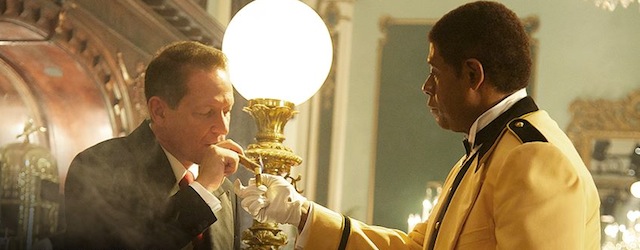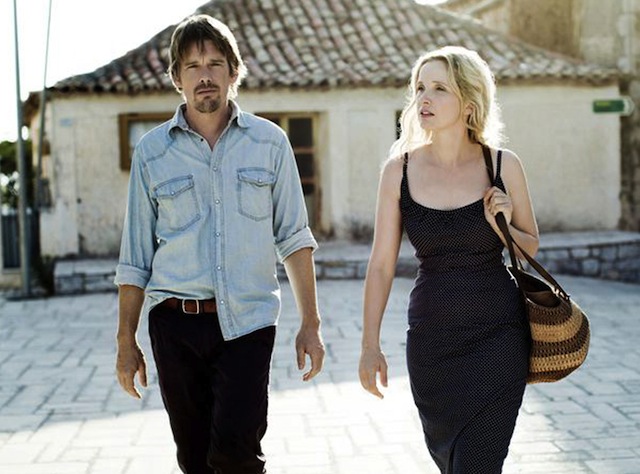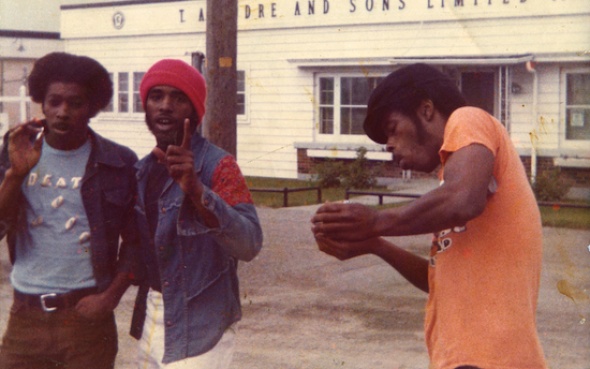Scott Lucas Picks His Favorite Movies Of 2013
By Scott Lucas in Arts & Entertainment on Jan 7, 2014 8:10PM
These days, waiting until the year is over to put a "best of" list together is kind of a quaint notion. Like an all ages show that's gotta clear out for the late-night dance-club party, everyone seems to be in such a rush to wrap it up and move on to all that Oscar speculating. The New York Film Critics Circle preemptively named American Hustle as best picture over a month ago. What's the hurry? Had they even seen The Wolf Of Wall Street? Unlikely, since it was still unfinished at the time—but if they had seen it, never mind the question of whether or not they would've had time to actually process it. Soon after, all those other circle jerks followed suit and the same movies turned up over and over: Gravity, Her, Inside Llewyn Davis, 12 Years A Slave, and the aforementioned American Hustle; coloring nearly every "best of" list to come down the hype chute. Why all the lock-step? Are these really "best of" lists? Or are they just advertisements for movies that most of the country hasn't even had a chance to see yet?
Which is just another way of saying that these lists don't really matter, but nevertheless here's another one. If it's any consolation, it only features two films that came out in the final weeks of 2013 (either Her was a bit underwhelming, or I'm going to need more time to process it), and there's a few that I haven't seen anywhere near a "best of" list. I'd also like to point out that I didn't get a chance to see a few films that I hear are pretty great, especially Computer Chess and Touch Of Sin, so consider this list incomplete. Here we go.

If you had asked me last summer which movie was likely to have more to say about race in America—Steve McQueen's 12 Years A Slave or Lee Daniels' The Butler —I would've laughed you out of the conversation. Surely, the Schindler's List of slavery movies would have no trouble crushing the Forrest Gump of feel good civil rights films. But if 12 Years A Slave is meant to be a corrective to Quentin Tarantino's Django Unchained, then The Butler is a corrective to them both. The Butler dares to be a movie that addresses racism without wallowing in slave imagery for its run time. In the partially fictional story of an African American White House butler, Daniels manages to convey how far we've come as a country while never letting us forget our shameful starting point—or the shameful growing pains along the way. He mainly does this by turning the conventional race-prestige picture on it's head in excluding the presence of any well meaning white people, indulging in some truly bizarre stunt cameos, and painting the warmest, funniest, and most nuanced picture of an American black middle-class family this year. And Oprah kills it. Maybe it's a matter of McQueen being one of the more pretentious directors working today and Daniels being one of the least (despite that title!), but Daniels manages to work in more truths by being subversive than McQueen does by hitting us over the head. I realize that's McQueen's point, so maybe I'm just sick of watching black actors dressed as slaves.
Like 12 Years A Slave and The Butler, Seth Rogen and Evan Goldberg's This The End will forever be linked in my mind with Edgar Wright and Simon Pegg's The World's End, two movies about dudes partying against the backdrop of the End Times. Now I yield to no one in my love of Wright and Pegg's Shaun Of The Dead, but once again I'm gonna go with the Americans on this one—mainly because This Is The End made me laugh harder than just about anything else this year (except maybe for The Wolf Of Wall Street). Rogen, Jay Baruchel, James Franco, Danny McBride, etc. decide to just say "fuck it" and play themselves as spoiled Hollywood narcissists trying to cope with the most literally Biblical end of the world since The Rapture. Sure, it may be one big self-referential in-joke, but it contains so many instant classic bits (Franco and McBride's mimed masturbation fight, Jonah Hill's Rosemary's Baby impersonation, a mistaken rape panic involving Hermione), that I can't imagine anyone but the most hating of haters minding too much. Funny's funny, man. I refuse to defend this choice.
8. Enough Said
Nicole Holofcener has gone from being an apprentice on '80s Woody Allen comedies to being one of our most astute chroniclers and critics of the well to do and their white people problems. She hasn't made a lot of movies—Enough Said is only her fifth feature since her 1996 debut, Walking And Talking—but her insights only get sharper, funnier, and more humane each time out. The deceptive contours of the rom-com plot—a divorced woman learns that she's been sleeping with her new friend's ex-husband—are just a springboard for Holofcener's auteurist preoccupations with class and polite society. And the results are glorious. She's aided in no small measure by a fine lead turn from Julia Louis-Dreyfus, easily one of the finest comic actresses ever to grace the big OR small screen, but Enough Said's real legacy may be as a showcase for a heartbreaking penultimate performance by James Gandolfini. That alone makes it unmissable.
7. Pacific Rim
Does everything have to be dark now? Iron Man; so troubled and dark. Star Trek went straight Into the Darkness. Thor's whole World was Dark. And Superman was just dull as dishwater. So it was nice to see a big, dumb summer movie that was smart enough to be FUN, for God's sake. Pacific Rim's reason for being—giant robots battling giant monsters—is, depending on your disposition, either kick-ass or sub-mental; but at least Guillermo Del Toro has the courage to present silly characters to go along with his, frankly, silly premise. In this post-Dark Knight age, I'd call that a virtue. Featuring a terrific prologue, nifty production design by long-time Cronenberg collaborator Carol Spier, and awesome Japanese monster movie-styled battles that push Michael Bay bullshit into neon abstraction until it resembles the psycho freak-outs of Gaspar Noé and Enter The Void. I haven't seen a sci-fi movie this energetic and playful since the Hollywood glory days of Paul Verhoeven.
At first, Derek Cianfrance's second collaboration with Ryan Gosling (after Blue Valentine in 2010) looks like it's going to be another entry in the smoldering, swooning canon of St. Gosling. And, yeah, for a while it is exactly that, but then The Place Beyond The Pines becomes something else; a critique of the cool cat criminal that Gosling plays in Drive. And when Gosling's dare-devil biker protagonist is swapped out for the considerably less charismatic Bradley Cooper as an ambitious rookie, who is then replaced by the virtually unknown Dane DeHaan; it also becomes a nervy experiment in dimming star wattage. You could say that makes for a movie that's gets less gripping as it goes along, or you could read it as an indictment of macho shit-head posturing and all the damage it does to people who aren't necessarily the shit-heads doing the posturing.
The Coen brothers are so consistently on their game that it's easy to take them for granted. We shouldn't. This understated comedy(?) about pre-Dylan folkies in Greenwich village is, quite possibly, the most beautiful thing the Coens have ever done. What more do you need?
Music documentaries are everywhere these days. The internet-aided fracturing of music hierarchies has spread so far that even bands who never even released a proper record are awarded rock docs filled with fawning testaments to their genius. That's fine with me, just as long as the movies are as great and as life affirming as this one about a band of three brothers in Detroit who formed the black proto-punk band, Death, about 30 years before anyone was even remotely ready for that unwieldy tag. After sitting through one too many movies this year featuring some rock star drummer who complains about being broke after he spent all his money on jet planes and drugs (or whatever it is rock star drummers spend all their money on)—A Band Called Death's message of fraternity and the belief in the power of music came on like a breath of fresh air.
I'm not sure that it was such a good idea for David O. Russell to release his Goodfellas rip, American Hustle (or as I like to call it The Martin Scorsese Playbook), the same week as Scorsese himself decided to return to Goodfellas form with The Wolf Of Wall Street. Maybe someday I'll be able to see Russell's film through different lenses, but not now. Not while Sheriff Scorsese is back in town. The breakneck pace, the endlessly quotable voiceover, the comic amorality—it's all here. Except this time, that rule book is shot through with the satiric bite of Billy Wilder. At times the movie plays like a '40s screwball comedy (especially during a Howard Hawksian bedroom screaming match between Leonardo DiCaprio and his new-ish bride, and ESPECIALLY during DiCaprio's uproarious "Quaalude Crawl" scene), but Scorsese, as usual, never lets the comedy eclipse the ugliness. Which makes the controversy over the movie's supposed glorification of criminals kind of a moot point. In the same way he took the warm, nostalgic Godfather glow off of gangsters in Goodfellas, Scorsese's gangsters of Wall Street are not shown as shrewd Gordon Gekko types, but rather as the frat boy buffoons that they really are. It's a treatment that couldn't be more appropriate.
A sweeping epic of human proportions, but let's get the sex out of the way first. Yeah, there's a lot of it in Abdellatif Kechiche's Palm D'Or winner about a young French girl's first love, and it's pretty strong stuff. There's been an effort by most critics to sweep all that sex under the carpet by saying it's only a fraction—about 22 minutes—of the film's 3 hour run time. Just as much time, it is argued, is given to scenes about food. Or scenes in the classroom. But 22 minutes of sex? Raw, hot, lesbian sex? That's like a Seinfeld episode full of sex. How do you ignore that? The answer is you don't. And like that Seinfeld episode where everyone goes to see Rochelle, Rochelle (one girl's erotic journey from Milan to Minsk), Blue Is The Warmest Color would seem to fit into a long tradition of foreign art films that flirt with prurience. But Kechiche's film has less in common with Last Tango In Paris than with Truffaut and his The 400 Blows. And in the end, everything in this movie is raw and hot. So, if not sex, what is this movie really about? If I had to pick one thing, it would be the face of Adele Exarchopoulos, who gives a star-making performance if there ever was one as the main character, Adele. Whether sleeping, eating, dancing, crying, marching during protest parades (my favorite sequences), whatever—Kechiche pushes his camera close in on Exarchopoulos' face and stays there, and that unbelievably expressive face tells us all we need to know. It's better than any special effect. This movie is fucking great.

Eighteen years ago we watched Jesse and Celine meet each other on a train in Europe. Were any of us aware that we were watching the beginnings of a love story so profound that it approaches Michael Apted's 7 Up series in its greatness? I wasn't. And yet, here we are with the third entry in Richard Linklater's superb series of films that began in 1995 with Before Sunrise. A third film that manages the impossible task of being the best of the bunch, a feat that I would argue has never been accomplished before. Richard Linklater, who has quietly become the best film maker of his generation, co-wrote the film with his two stars, Ethan Hawke and Julie Delpy, and the three have grown so skilled and fearless in their portrayal of our beloved couple that we could almost be forgiven for our continued folly in thinking that, this time, there's no way that they could top themselves. Except, of course, they probably will. Tongues are sharper this time around, and there's a bravura all-out hotel-room-war-of-words set piece that's as upsetting as watching your parents fight—but the sense of wistfulness and romance is bone deep. Right down to the marrow. You think those kids in Titanic would've gotten this far? Linklater has one of the best filmographies around, but Before Midnight might be his masterpiece.
And here's 5 more:
11. All Is Lost with a stellar performance by Robert Redford.
12. Ben Wheatley's Sightseers.
13. Cate Blanchett helped Woody Allen return to form in Blue Jasmine.
14. Michael Cera as a big, dumb American asshole in Crystal Fairy & The Magical Cactus.
15. And, oh, what the hell? American Hustle.
